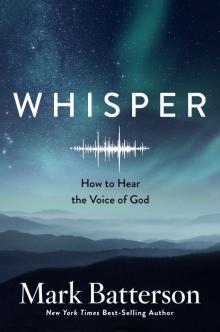- Home
- Mark Batterson
Whisper Page 3
Whisper Read online
Page 3
Here is the significance of that discovery: the four words spoken by God in the beginning are still creating galaxies at the outer edges of the universe. Four words! And the result is an ever-expanding universe that measures at least ninety-three billion light-years in diameter.7
If God can do that with four words, what are we worried about?
The very first revelation of God was as Creator. And because His creation is so awe inspiring, it’s easy to overlook how God did what He did. But to me, the mechanism of creation is just as amazing as creation itself.
How did God create? With His voice! The universe is His way of saying, “Look at what I can do with four words.” The voice that spoke the universe into existence is the same voice that parted the Red Sea and made the sun stand still. His voice can heal a withered hand or wither a barren fig tree. His voice can turn water into wine, install synaptic connections between the optic nerve and visual cortex in a blind man’s brain, and resurrect a man four days dead.8
There is nothing God’s voice cannot say, cannot do. And, frankly, He can do it however He pleases! He can speak through burning bushes, Balaam’s donkey, or Bethlehem’s star. His voice can write on palace walls or shut the mouths of lions. It can quench the flames of a fiery furnace or stop a storm on the Sea of Galilee.9
The voice of God is all-powerful, but that’s only half the story. His voice is also all-loving. In the pages that follow, we’ll explore seven languages of God. The first language is Scripture, and it’s the Rosetta stone. The other six languages we’ll look at are secondary languages: desires, doors, dreams, promptings, people, and pain. But all of them are love languages. Why? Because “God is love.”10
Sweetness
One reason we turn a deaf ear to God is because we’re afraid of what He’s going to say, but that’s because we don’t know His heart toward us. You want to hear what He has to say. Trust me. The Song of Songs says, “His mouth is sweetness itself.”11
According to rabbinic tradition, when God spoke to the Israelites at Mount Sinai, they were so scared that they felt as though their souls left them.12 That’s what happens when God uses His outside voice! So what did God do? He sweetened His words, softened them, until their souls returned to them.13 Maybe that is nothing more than a rabbinic legend, but it fits God’s character. When He wants us to repent, what does He do? He doesn’t threaten us or nag us or yell at us. He shows us kindness.14 And if that doesn’t work? He resorts to more kindness.
For eighteen months Zac Jury attended National Community Church while working at FBI headquarters. Zac is your prototypical agent. He’s a tough guy, a smart guy. But all of us have a soft spot, and that is often where God speaks to us.
“I never really understood or really accepted that God loves me for me, as me,” said Zac. “But that changed the day I stood at the end of an NCC service at the Lincoln Theatre—row J, seat 111. That’s where I heard the still small voice say over and over again, I love you, I love you, I love you, I love you, I love you, I love you. He must have whispered those words to me at least a hundred times. With tears pouring down my face, I experienced His love in the most visceral way I ever have. The Lincoln Theatre is a profoundly special place to me. It will forever be the place where I heard, really heard and believed, that the Lord loves me.”
I believe that if you listen carefully, you’ll hear the same thing.
I know that many people have a hard time believing God is loving, and it’s often because someone represented Him in a way that misrepresented Him. But I promise you this: the heavenly Father is speaking over us the same thing He spoke over Jesus at His baptism: “This is my beloved Son, in whom I am well pleased.”15 You are His beloved, and He’s especially fond of you. You just have to let Him love you.
Isn’t that a voice you want to hear?
During our dating days Lora and I attended different colleges for a semester. As I have already mentioned, I eventually transferred from the University of Chicago to Central Bible College. But it wasn’t just because I felt a call to ministry. It was also because the phone calls were going to cost more than tuition. It was cheaper to transfer.
Why did we spend hours on the phone during those long-distance days? Because when you love someone, you love the sound of his or her voice. And you long to hear it. A relationship with God is no different.
And God Sang
The famed composer and conductor Leonard Bernstein believed that “the best translation of the Hebrew in Genesis 1 was not ‘and God said’ but ‘and God sang.’ ”16 Although there might be a musical prejudice at play, I quite like his interpretation. Creation is God’s symphony, and science provides plenty of corroborating evidence.
Did you know that the electron shell of the carbon atom produces the same harmonic scale as the Gregorian chant?17 Makes you go hmmm.
According to the science of bioacoustics, millions of songs are being sung all the time. Of course, the vast majority of those songs are infrasonic and ultrasonic. “If we had better hearing,” said physician and researcher Lewis Thomas, “and could discern the descants of sea birds, the rhythmic timpani of schools of mollusks, or even the distant harmonics of midges hanging over meadows in the sun, the combined sound might lift us off our feet.”18
Juxtapose that with this.
Then I heard every creature in heaven and on earth and under the earth and in the sea. They sang:
“Blessing and honor and glory and power
belong to the one sitting on the throne
and to the Lamb forever and ever.”19
This isn’t future-tense prophecy; it’s present-tense reality.
When we cross the space-time continuum and enter a dimension the Bible calls heaven, we’ll get a glorified body. And I’m looking forward to some new body parts, including glorified abs! But what excites me most is the thought of glorified senses. We’ll finally be able to hear angel octaves, and their chorus will lift us off our feet. Until then, we settle for Bach or Bono or Bieber.
One footnote. Remember Dr. Alfred Tomatis? He said, “The ear has a poor physiological response to pure sounds.” Instead, “It loves complexity.” What kind of complexity? “In order for the ear to respond tangibly, a minimum of three frequencies must be put into simultaneous play.”20
Three frequencies? What a coincidence, or perhaps providence!
Creation is three-part harmony: Father, Son, and Holy Spirit. And just as the Trinity sang every atom into existence, every atom echoes its unique note back to God. Creation is call and response. When Scripture speaks of mountains singing and trees clapping, it’s not just metaphorical.21 If our range of hearing were a little better, we would hear the voice of God in every drop of water, every blade of grass, every grain of sand.
Range of Hearing
When we see the word said, we think phonics, but we should think physics, especially if God is the One doing the saying. After all, sound is first and foremost a form of energy. The human voice is pretty much good for one thing—verbal communication. So we tend to think of God’s voice in the same vein. But His voice is so much more than audible words communicated in human language. God uses His voice to speak, but He also uses it to heal and reveal, convict and create, guide and grace. For His voice to be fully appreciated, it must be compared and contrasted with the human voice.
Scientifically speaking, the human voice is made up of sound waves traveling through space at 1,125 feet per second. The average male speaks at a frequency of 100 hertz, while the average female speaks in a higher-pitched voice, around 150 hertz. There are the Barry Whites and Céline Dions, who push vocal boundaries, but our vocal range is between 55 and 880 hertz. We also have a range of hearing, and it’s limited to sound waves between 20 and 20,000 hertz. Anything below 20 hertz is infrasonic. Anything above 20,000 hertz is ultrasonic.22 And it’s when we get outside our range of hearing that the miracle of sound is rea
lly revealed.
Below our range of hearing, infrasound has the capacity to cause headaches and earthquakes. According to zoologists, using infrasound is the way elephants predict changes in weather. It also helps birds navigate as they migrate. And infrasound can also be used to locate underground oil or predict volcanic eruptions.
Above our range of hearing, ultrasound has the capacity to kill insects, track submarines, break glass, perform noninvasive surgery, topple buildings, clean jewelry, catalyze chemical reactions, heal damaged tissues, pasteurize milk, break up kidney stones, drill through steel, and give you a glimpse of your unborn baby via sonogram.
Does God speak audibly? Absolutely! But that’s a thin slice of His vocal range. His ability to speak is way beyond our ability to hear audibly. Just as there are people who claim they’ve never experienced a miracle, there are people who argue that they’ve never heard the voice of God. I would argue otherwise. That may be true of His audible voice within our small range of hearing, but everything we see was structured by His acoustic oscillations.
What we see today, He once said.
His voice is all around us, all the time!
Bigger Than Big
If creation reveals anything, it’s that God is bigger than big. The theological word is transcendence, and it’s evidenced by the size of the universe.
Earth is larger than Mars, Mercury, and the moon. But it’s significantly smaller than Uranus, Neptune, Saturn, and Jupiter. Jupiter is 1,321 times larger than Earth in terms of volume, but it’s 10 times smaller than the sun. And the sun is a relatively small yellow dwarf star. Arcturus, an orange giant, is 26 times bigger than the sun and produces 200 times more energy. Antares, a red supergiant, is 10,000 times brighter than the sun. And we’re not even out of the Milky Way galaxy!
And to us, Earth seems huge. Not so much.
It’s not just a reminder of how incredibly small we are; it’s a reminder of how incredibly big God is. He doesn’t exist within the space-time dimensions that He created, so quit putting four-dimensional limits on Him. “With the Lord a day is like a thousand years, and a thousand years are like a day.”23 That makes no sense if you exist in a time dimension, but it makes perfect sense if you exist outside of time.
We have a hard time thinking of God in anything other than four dimensions, because that’s all we’ve ever known. And we try to create God in our image rather than allowing Him to create us in His. What we end up with is a god, lowercase g, who walks and talks an awful lot like us.
“How much happier you would be,” said G. K. Chesterton, “how much more of you there would be, if the hammer of a higher God could smash your small cosmos!”24
God is bigger than big, but that’s a little intimidating if left by its lonesome. The good news? There is a theological counterbalance to that bigness. It’s called the immanence of God: God is also closer than close.
God’s love is meteoric,
his loyalty astronomic,
His purpose titanic,
his verdicts oceanic.
Yet in his largeness
nothing gets lost.25
God is great not just because nothing is too big; God is great because nothing is too small. God doesn’t just know you by name; He has a unique name for you.26 And He speaks a language that is unique to you.
Custom Fitted
The twenty-ninth psalm is a powerful yet poetic depiction of God’s outside voice. I often think of that psalm during thunderstorms because in it the voice of the Lord is depicted as peals of thunder and flashes of lightning. Then there is this statement, which seems to be an understatement: “The voice of the LORD is powerful.”27
One translation says, “The voice of the Lord is fitted to the strength.”28 In other words, it is custom fitted to the unique strength of each and every person. Translation: God speaks your language!
There is a theory in organizational development called appreciative inquiry that I subscribe to as a leader and a parent. Instead of exclusively focusing on what’s wrong and trying to fix it, you identify what’s right and try to replicate it. Appreciative inquiry is playing to people’s strengths. It’s catching people doing things right. It’s celebrating what you want to see more of. And it’s bragging about people behind their backs.
I’m certainly not suggesting that God doesn’t convict us of our sin; He does. Call it a “sin inquiry” if you want. But He also pulls our potential out of us via appreciative inquiry. Why? Because He’s the One who gave it to us in the first place. How? By speaking to our strengths.
In part 2 of this book, we’re going to explore seven of God’s love languages. But it’s not an exhaustive list by any means. I don’t even include the language of nature, which seems like a sin of omission. The reality? God speaks billions of dialects, including yours.
I recently met an Indian pediatrician who attends our church and who grew up in a Hindu family. She told me that she put her faith in Jesus Christ while reading a book called Am I a Hindu?29 I don’t know if there is another person on the planet who found Jesus the way this woman did. But it’s a testament to the God who speaks our unique language.
Lost in Translation
In her brilliant book A Natural History of the Senses, author Diane Ackerman humorously shared an incident that reveals how difficult it can be to understand one another, even if we speak the same language. Diane, who hails from Waukegan, Illinois, was visiting Fayetteville, Arkansas, when she asked her host if there was a spa in town. Ackerman was aware of the famous hot springs and thought it would be an enjoyable way to spend the afternoon. She quickly discerned by the quizzical look on her host’s face that something got lost in translation. “Spas?” said her host in a thick Arkansan accent. “You mean Russian agents?”30
We don’t always hear what’s actually being said. Why? Because we hear everything through the filter of our histories, our personalities, our ethnicities, and our theologies.
Did you know that citizens of different countries actually hear differently? It’s called a basic-frequency band. The French ear, for example, hears best between 1,000 and 2,000 hertz. The British bandwidth is much larger, between 2,000 and 12,000 hertz. And the American ear hears between 750 and 3,000 hertz.31
In a very real sense, there is a French ear, a British ear, and an American ear. I might also suggest that there is a Catholic ear and a Protestant ear, a Republican ear and a Democrat ear, a male ear and a female ear. Just because we speak the same language, it doesn’t mean we hear one another. We speak dialects that are as different as spas and spies.
And what’s true linguistically is true spiritually. I absolutely believe in absolute truth, but my understanding of that truth is not omniscient. It’s not even objective. Thankfully, there is a God who is big enough to speak a language we each can understand.
Big Enough
In his book A Mile Wide, Brandon Hatmaker shares the story of his first trip to Ethiopia, when he went to work with his friend Steve Fitch, the founder of Eden Projects. Deforestation has devastated parts of Ethiopia as generation after generation has stripped the forests bare, leaving the land barren. Eden is a reforestation effort, with a vision to plant a hundred million trees.
By the time Brandon boarded the plane, he was having second thoughts about the trip. He had a fear of flying, he was leaving his family behind, and he wondered what difference his going would make. Brandon was feeling bad about his attitude, so he closed his eyes and prayed, “God, I’m sorry. I’m trying, but I just don’t get it. I don’t want to be on this plane. I feel like I’m wasting time and money. If this is important to you, will you please overcome my ignorance, doubt, and blindness? Will you connect the dots and show me what I’m missing? Amen.”32
No sooner had Brandon opened his eyes than the thirtysomething Ethiopian man sitting next to him asked why he was going to Ethiopia. Brandon could have given a few differ
ent answers, ranging from community development to ministry. For some reason he simply said he was going to plant trees. That’s when the elderly woman sitting next to the Ethiopian man asked him a question in Amharic. When he responded in Amharic, she literally began to wail. In fact, she stood up and starting waving her hands in the air like she really did care.
“What’s going on?” Brandon asked.
“My mother asked me why you were going to Ethiopia,” he said.
Brandon responded, “What did you tell her?”
He said, “I told her you were going to plant trees.”
And Brandon asked, “What is she saying?”
That’s when Brandon’s seatmate revealed that his mother had been praying for thirty-eight years that God would forgive her people for stripping their land. She also had been praying for Him to send someone to plant trees. Before Brandon knew what was happening, this woman was laying her hands on his head and praying for him through her tears of joy.
Can I remind you of a simple truth? You are the answer to someone else’s prayer. In this instance it was a prayer that this woman had been praying for longer than Brandon had been alive. And I might add, it was a brave prayer!
Not surprisingly, Brandon had a renewed sense of purpose. And he walked away from that experience with this insight: “My gospel was too small.”33 Maybe it’s not just our gospel that is too small. Maybe it’s also our understanding of God’s voice.
I have a fundamental conviction: God is big enough. He’s big enough to keep the planets in orbit. He’s big enough to reveal Himself to Babylonian astrologers living a thousand miles from Bethlehem. He’s big enough to reveal Himself to Hindu pediatricians and Ethiopian grandmothers. And on a personal note, He’s big enough to reveal himself to a five-year-old boy named Mark Batterson through a Billy Graham film called The Hiding Place.34
God is big enough.

 Jack Staples and the Ring of Time
Jack Staples and the Ring of Time Jack Staples and the City of Shadows
Jack Staples and the City of Shadows Jack Staples and the Poet's Storm
Jack Staples and the Poet's Storm Whisper
Whisper The Circle Maker_Praying Circles Around Your Biggest Dreams and Greatest Fears
The Circle Maker_Praying Circles Around Your Biggest Dreams and Greatest Fears